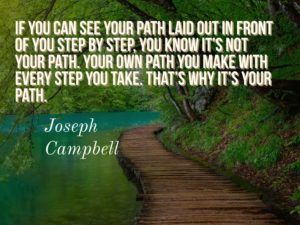 I’m listening to Brene Brown‘s latest, Braving the Wilderness: The Quest for True Belonging and the Courage to Stand Alone. In the front half of the book she references a Joesph Campbell quote that reminded me just how challenging and lonesome the work of transforming our schools can be. It also reminded me that we should be wary of buying into the pre-designed “solutions” of the so-called experts. (Saying there is a clear path to any change is just marketing.)
I’m listening to Brene Brown‘s latest, Braving the Wilderness: The Quest for True Belonging and the Courage to Stand Alone. In the front half of the book she references a Joesph Campbell quote that reminded me just how challenging and lonesome the work of transforming our schools can be. It also reminded me that we should be wary of buying into the pre-designed “solutions” of the so-called experts. (Saying there is a clear path to any change is just marketing.)
If you can see your path laid out in front of you step by step, you know it’s not your path. Your own path you make with every step you take. That’s why it’s your path. ~Joseph Campbell
We’ve grown up in an educational system – as learners, teachers and leaders – that loves robbing us of our agency – telling us what to do, how to do it, how long to spend doing it, etc. What are the ten steps? Where’s the script? What are the keys to success? I continue to be curious about the idea of agency, and I want to surface some questions in this short post:
- Why are so many educators willing to give up the obligation to personalize solutions to the challenges of their own context? Are we conditioned from living in a pre-packaged world? Our food is pre-packaged. Our news is pre-packaged. School is pre-packaged. What problem doesn’t already have a “program” to solve? Even our college degree was largely pre-packaged. When have we embraced opportunities for deep work where we’ve had to create unique meaning, frameworks and art?
- Why do so many educators avoid deep work and take the short cuts of standardized solutions? What are we afraid of? Can Brown’s work on loneliness provide insight (ironically)? Do we just want to belong to the dominant group – the socially accepted group – pursuing the latest magic bullet? Does it have to do with the “heaving lifting” of deep work and not really wanting to commit the time and resources?
One of the greatest takeaways from sharing in conversation on the Shift Your Paradigm Podcast with Lynn Fuini-Hetten and others from around the country is that there is no formula for the work that we are doing – shifting to learner-centered education. Or for any transformation in education, for that matter. We can learn a great deal from the practitioners who are often doing inspiring work, pushing the boundaries of the “we’ve laid out your path” of efficient, traditional education. But in the end, there is no pre-designed magic formula that will bring the shift to scale. It just doesn’t exist. What we can do is study the work of others (successful and not-so-successful), intersect that learning with what we know about our own contexts, and work with others in the organization to lay a unique path to transformation. The experiences and theories of others provide the edges of the sandbox, but we have to get in the sandbox and, together, create some new art. There is no other way. It’s challenging but also inspiring. More inspiriting than any formula.
What is keeping education in the “pre-packaged” orbit of educational transformation?
Connect with Randy on Twitter, the TLTalkRadio podcast, and the Shift Your Paradigm podcast!
Get new content delivered to your inbox and the ebook 3 Key Principles of Digital Transformation. The ebook contains valuable information from my experience leading a digital transformation and working with a variety of stakeholders over the past decade.
- A silver lining - January 22, 2022
- Is our use of tech working against us? 🤔 - September 8, 2021
- What’s NOT going to change in the next 10 years? 🤔 - September 7, 2021